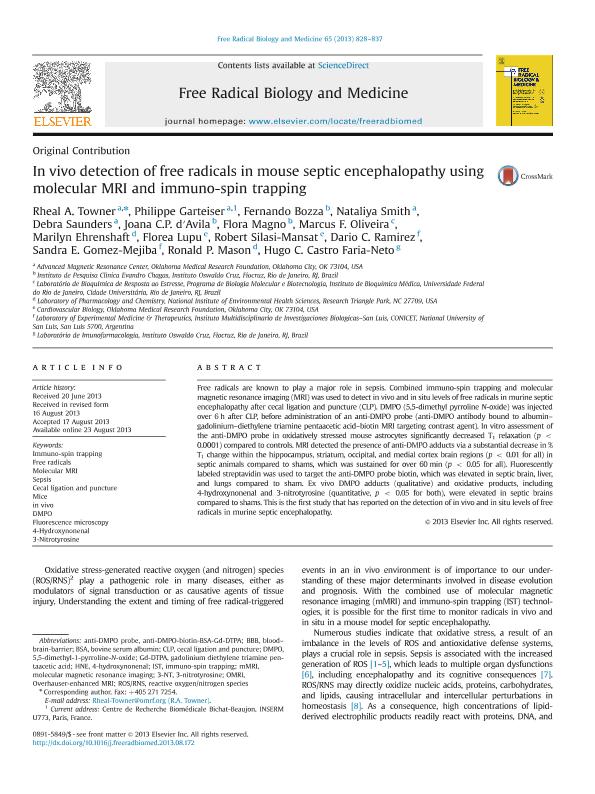Artículo
In vivo detection of free radicals in mouse septic encephalopathy using molecular MRI and immuno-spin trapping
Towner, Rheal A.; Garteiser, Philippe; Bozza, Fernando; Smith, Nataliya; Saunders, Debra; D'Avila, Joana C.P.; Magno, Flora; Oliveira, Marcus F.; Ehrenshaft, Marilyn; Lupu, Florea; Silasi Mansat, Robert; Ramirez, Dario ; Gomez-Mejiba, Sandra Esther
; Gomez-Mejiba, Sandra Esther ; Mason, Ronald P.; Castro Faria Neto, Hugo C.
; Mason, Ronald P.; Castro Faria Neto, Hugo C.
 ; Gomez-Mejiba, Sandra Esther
; Gomez-Mejiba, Sandra Esther ; Mason, Ronald P.; Castro Faria Neto, Hugo C.
; Mason, Ronald P.; Castro Faria Neto, Hugo C.
Fecha de publicación:
02/2013
Editorial:
Elsevier Science Inc.
Revista:
Free Radical Biology and Medicine
ISSN:
0891-5849
e-ISSN:
1873-4596
Idioma:
Inglés
Tipo de recurso:
Artículo publicado
Clasificación temática:
Resumen
Free radicals are known to play a major role in sepsis. Combined immuno-spin trapping and molecular magnetic resonance imaging (MRI) was used to detect in vivo and in situ levels of free radicals in murine septic encephalopathy after cecal ligation and puncture (CLP). DMPO (5,5-dimethyl pyrroline N-oxide) was injected over 6 h after CLP, before administration of an anti-DMPO probe (anti-DMPO antibody bound to albumin-gadolinium-diethylene triamine pentaacetic acid-biotin MRI targeting contrast agent). In vitro assessment of the anti-DMPO probe in oxidatively stressed mouse astrocytes significantly decreased T1 relaxation (p < 0.0001) compared to controls. MRI detected the presence of anti-DMPO adducts via a substantial decrease in %T1 change within the hippocampus, striatum, occipital, and medial cortex brain regions (p < 0.01 for all) in septic animals compared to shams, which was sustained for over 60 min (p < 0.05 for all). Fluorescently labeled streptavidin was used to target the anti-DMPO probe biotin, which was elevated in septic brain, liver, and lungs compared to sham. Ex vivo DMPO adducts (qualitative) and oxidative products, including 4-hydroxynonenal and 3-nitrotyrosine (quantitative, p < 0.05 for both), were elevated in septic brains compared to shams. This is the first study that has reported on the detection of in vivo and in situ levels of free radicals in murine septic encephalopathy. © 2013 Elsevier Inc.
Archivos asociados
Licencia
Identificadores
Colecciones
Articulos(IMIBIO-SL)
Articulos de INST. MULTIDICIPLINARIO DE INV. BIO. DE SAN LUIS
Articulos de INST. MULTIDICIPLINARIO DE INV. BIO. DE SAN LUIS
Citación
Towner, Rheal A.; Garteiser, Philippe; Bozza, Fernando; Smith, Nataliya; Saunders, Debra; et al.; In vivo detection of free radicals in mouse septic encephalopathy using molecular MRI and immuno-spin trapping; Elsevier Science Inc.; Free Radical Biology and Medicine; 65; 2-2013; 828-837
Compartir
Altmétricas



